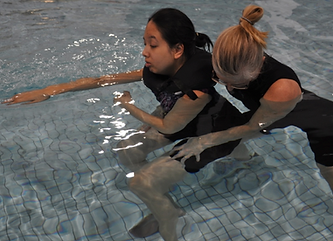
Adult Neurological Aquatic Therapy
Course Instructors: Audrey Collins, Alison Bonnyman

AQUATIC THERAPY FOR INDIVIDUALS WITH A NEUROLOGICAL CONDITION
DATE: Sunday, March 29th, 2026 from 9am-4pm
INSTRUCTOR: Audrey Collins, PTA, IATF certified
COST: $400
LOCATION: 2568 Gelert Rd, Minden Hills, ON K0M
REGISTER: Audrey.rehab@gmail.com

Course Description
Overview:
This course will focus on the effective use of hydrodynamics for the rehabilitation and functional gains post-stroke, ABI, SCI, and other progressive/intermittent neurological conditions. The unique properties of water will be optimized to address abnormal
muscle tone, functional strength, gait, balance and endurance, and to utilize hydrodynamics to engage coordination, trunk engagement and heighten the sensorimotor response. Research protocols, interventions and dosage will be explored to apply to clinical practice. This is for clinicians with a good understanding of the pathophysiology of neurological conditions and want to augment patient care, provide safe and earlier falls prevention and bridge their patients into lifelong aquatic physical activity in their community.
Topics include:
-
Review of the physiology of immersion and its effects on pathophysiology
-
Functional approach to assessment, aquatic adaptations and interventions
-
Active and passive aquatic therapy interventions to address specific goals
-
Exercise prescription and progressions
-
Research on Aquatic Therapy interventions for people with Neurological
conditions -
Effective aquatic therapy treatment plans to address goals
Course Format:
-
Lectures
-
Hands-on, in-pool practice sessions with quizzes, group work
-
Demonstration treatments with patients (facility dependent)
-
Case-based learning/testing
-
Clinical case videos
-
Aquatic therapy equipment provided to try
Program Objectives
By the end of this course, participants will be able to:
-
Understand the advantages, limitations, contraindications, and precautions of aquatic therapy for the neuro client.
-
Apply the principles of buoyancy, turbulence, drag to design effective treatment plans specific to their clients rehabilitation goals.
-
Apply active and passive aquatic therapy techniques to address rehab goals.
-
Explore the research to then apply appropriate interventions, dosage and intensity to clinical practice.
-
Implement evidence-based aquatic therapy treatment plans and progressions.
TO HOST THIS COURSE CLICK ON:
or send us an email aquaticrehabpt@gmail.com



